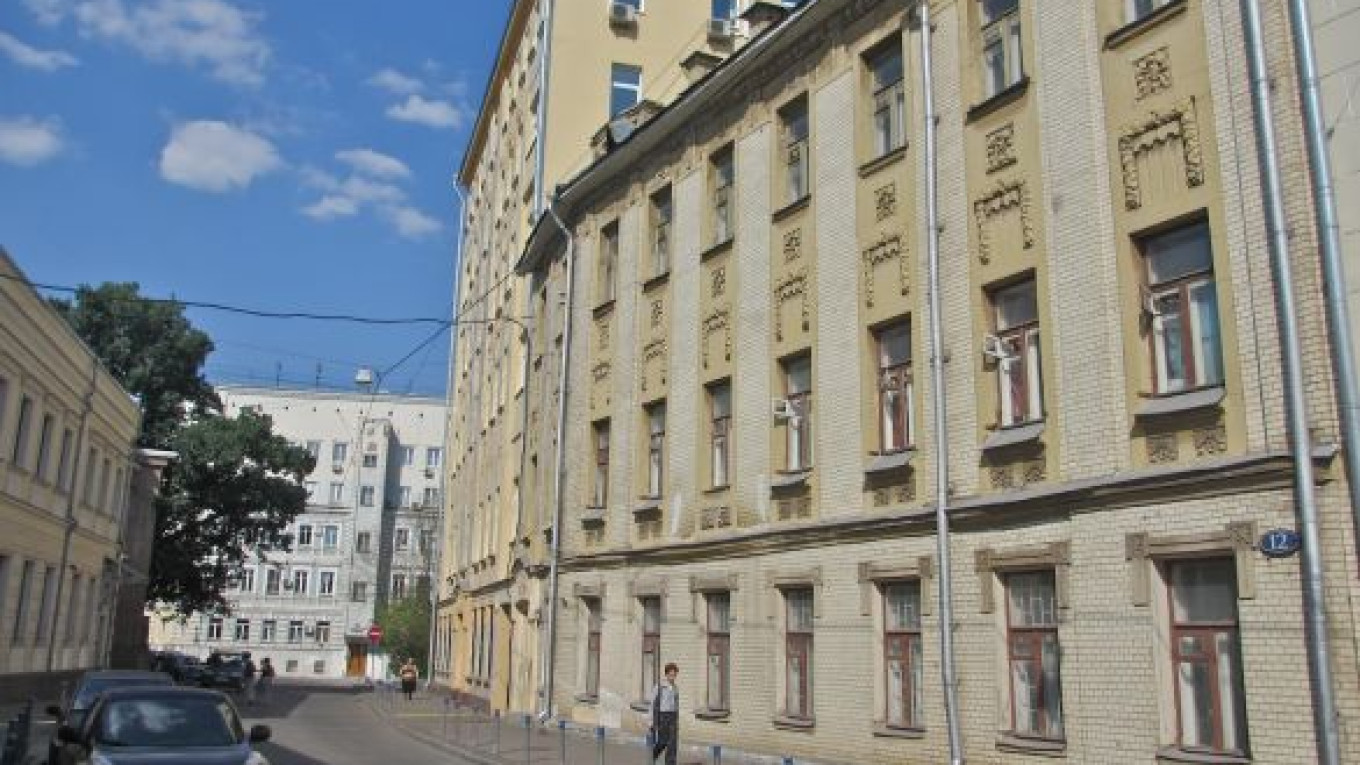I have always been fascinated by the personalities of buildings. Some have their own. Some acquire it thanks to people or events associated with them.
Consider building No. 12 on Voznesensky Pereulok. I have passed by this relatively, though not excessively, attractive building in the center of Moscow dozens, if not hundreds of times, over the years. I never once recall taking note of it.
There's a beautiful church right around the corner at 2/15 Yeliseyevsky Pereulok — the Church of the Assumption at Uspensky Ravine. That I cannot forget.
A few steps further on there is a fascinating apartment complex at 7 Bryusov Pereulok. Some of the greatest musical talents of the Soviet period lived here throughout the 20th century. As did my one-time editor at The Moscow Times, Margaret Henry.
But the yellowish, partly tiled building on Vozensensky? Well that was never anything other than a place I had to get past on my way to the Okolo Theater.
Then I happened to see in an old book I own that Solomon Mikhoels, the great Jewish actor, once lived at 12 Voznesensky Pereulok. That made me stand up and take note.
Mikhoels is one of the great figures of Russian/Soviet/Yiddish theater. His performance of King Lear in the 1930s is one of the touchstones of 20th-century world theater. Before he was murdered by the Soviet secret police in 1948, he was the artistic director and lead actor at the Moscow State Jewish Theater — the venue that we now know as the Theater na Maloi Bronnoi. A plaque hangs outside that theater commemorating his memory.
There are no historical markings, however, at 12 Voznesensky Pereulok. It's just a nice old building like many others in the city center. It has a pleasant curve to it, as it sticks close to the slightly bending road. There is clearly an old half, three stories in an older style, and a newer half, six stories that were obviously built later.
Both halves bear the address of 12, so I can't say for sure where Mikhoels' living quarters would have been, although I suspect it's a good guess that they would have been in the older half.
That information, as skimpy as it may be, has changed Voznesensky Pereulok for me.
Now as I walk past Mikhoels' old home going to or from the Okolo Theater I run my gaze across those windows, and I imagine Mikhoels' eyes peering back out in my direction from one of them. He does not see me, of course. He is looking down at whatever the street looked like in 1927, when that book I have was published. The street was called Ulitsa Stankevicha at the time, having been renamed from its pre-revolutionary moniker of Bolshoi Chernyshevsky Pereulok. Beneath his window there may or may not stand a motor vehicle or two, perhaps a horse-drawn cart. Surely there are pedestrians. The men probably wear tweed jackets, the women broad-rimmed hats and clingy skirts hanging well below the knees. On a small table beside the actor standing at his windowsill there may be a telephone. He did have a phone — its number was 2-15-42.
Mikhoels looks down not yet knowing anything that I know as I look back up toward him.
He doesn't yet realize that Stalin will have a team of thugs chase him down in a car and run him over in Minsk the night of January 12/13, 1948. He has no idea that after his death Stalin will give him a pompous state funeral intended to make a hero and martyr of him.
As the man I imagine stands there looking out his window, he knows nothing whatsoever about the fact that in 2009 I will see an exhibit devoted to his life and work at the Jewish Museum located just off of New York's Central Park East.
He can't possibly imagine that I will stop and stand for several minutes in front of the last item in the exhibit — a crushed pair of small, circular, wire-rimmed glasses that he wore that night he was struck and left for dead on the side of the road.
Those glasses. That King Lear. That actor who lived a few of his earthly years at 12 Voznesensky Pereulok in Moscow. They're all there together for me now every time I pass that house, a place I had never noticed and that I never will again ignore.
Related articles:
A Message from The Moscow Times:
Dear readers,
We are facing unprecedented challenges. Russia's Prosecutor General's Office has designated The Moscow Times as an "undesirable" organization, criminalizing our work and putting our staff at risk of prosecution. This follows our earlier unjust labeling as a "foreign agent."
These actions are direct attempts to silence independent journalism in Russia. The authorities claim our work "discredits the decisions of the Russian leadership." We see things differently: we strive to provide accurate, unbiased reporting on Russia.
We, the journalists of The Moscow Times, refuse to be silenced. But to continue our work, we need your help.
Your support, no matter how small, makes a world of difference. If you can, please support us monthly starting from just $2. It's quick to set up, and every contribution makes a significant impact.
By supporting The Moscow Times, you're defending open, independent journalism in the face of repression. Thank you for standing with us.
Remind me later.


